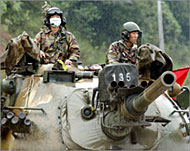South Korean faces spy charge
South Korean prosecutors are seeking an arrest warrant for Song Doo-Yul, a German scholar of Korean origin, accused of spying for North Korea.

Song, 59, is accused of joining North Korea’s ruling communist Workers Party in 1973 and rising to 22nd in the party hierarchy.
Prosecutors from the Seoul prosecution office explained the charges to reporters on Tuesday, after a month-long investigation of his espionage charges.
“It is a grave case. He shows little regret. We apply (sic) for an arrest warrant for him because there are fears of his destroying evidence and escaping,” a top prosecution investigator told journalists.
The Seoul district court will decide whether to issue the arrest warrant on Wednesday, court officials said.
The prosecution’s move came a week after President Roh Moo-Hyun called for “tolerance” towards the Muenster University professor who returned home last month after living in exile for 37 years.
‘Extreme confrontation’
Roh said Song was accused of violating Seoul’s national security laws, enacted during a time of “extreme-confrontation and division” between the two Koreas, which are now moving towards reconciliation.
 |
|
South and North Korea have had |
Pro-Pyongyang acts, including unauthorised trips to North Korea, are banned by South Korea laws.
Despite the recent rapprochement, South Korea is still technically at war with North Korea – more than half a century after the 1950-1953 Korean War.
Song, who has been under questioning by security authorities since his homecoming on 22 September, vowed last week to sever all ties with Pyongyang and give up his German citizenship in order to remain in South Korea.
South Korea’s main spy agency, the National Intelligence Service (NIS), has said that Song has admitted to being a politburo member of North Korea’s ruling Workers Party under the alias of Kim Chul-Su.
But Song has denied the claims, despite his admission to having joined the North Korean communist party.
Song, who grew up in South Korea, went to Germany in 1967 for his studies.
He became a key figure among Germany-based South Korean dissidents, opposed to then president Park Chung-Hee’s repressive military government in Seoul.